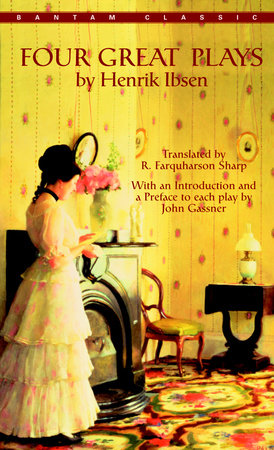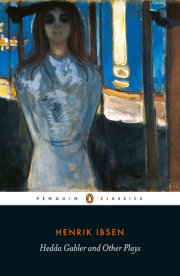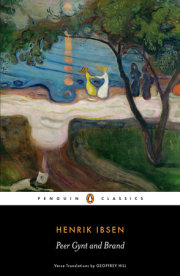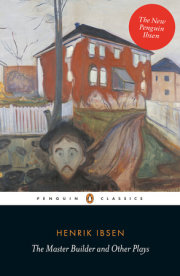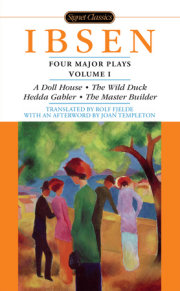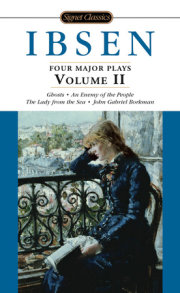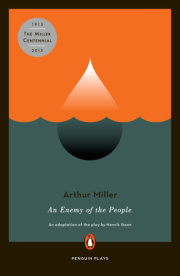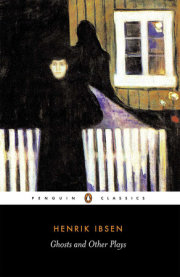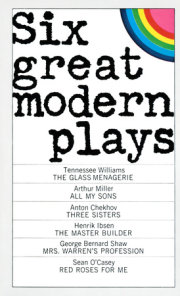A DOLL'S HOUSE
A Doll's House was not the first of Ibsen's plays to make enemies for him; but it was the first to spread his reputation as a subversive playwright abroad, and arouse enmity toward him in foreign lands. Ibsen's subject was no longer local politics, as in the earlier
Love's Comedy, but the miseducation and subjugation of the European middle-class woman. It is difficult to overestimate the significance, and, indeed, the novelty of such a theme for Victorian readers and audiences.
Although
A Doll's House no longer arouses such burning topical interest, it remains a vital drama of character. Ibsen's strong-willed heroine, Nora, is no mere case history in a suffragette bill of particulars. Far from being a typical victim of male domination, Nora is master of the domestic world she calls her doll's house. She has the initiative to nurse her husband through a long illness, the courage to forge his name to a promissory note in order to get the money for his convalescence, and she is even able, in the face of enormous difficulties, to meet the payments on her loan. Only when a disgruntled employee of her husband's bank tries to blackmail Nora's husband into restoring him to the job from which he has been fired is Nora's deception revealed.
The play's turning point is based far less on Nora's supposed innocence of the realities of the world than on her husband's understandable fear of scandal in their provincial bourgeois world. Because her notion that marriage could protect her from all eventualities is shattered, and because she had romantically expected heroic sacrifices from him, Nora resolves to find some basis for her marriage other than bourgeois convention and girlish romanticism: she decides to leave her "doll's house" to seek independence in the "outside world." Although her example might be cited as an object lesson by feminists, Ibsen took great pains to make her disenchantment and climactic decision the result of her unique personal character and experience.
At the very end of the play Ibsen is forced to push his argument very hard to convince us that Nora really believes she can leave her young children behind when she deserts her husband. But precisely this drastic conclusion, no matter how it stretches credibility, has secured polemical importance for the play. As George Bernard Shaw concluded in
The Quintessence of Ibsenism, the most original part of the play was the discussion Nora initiated once the threat of prosecution for forgery was completely removed by the blackmailer's repentance. In a conventional "well-made" drama, Torvald's eagerness to forget the entire unpleasant crisis would have been followed by a quick reconciliation and an unclouded denouement. In rejecting such a conventional climax, Ibsen was transcending Scribe and the nineteenth-century commercial theatre. At the same time, he was trying to ground his play in the psychological realities of human character, in the tradition of such great masters of nineteenth-century realism as Balzac, Flaubert and Turgenev, rather than in mere theatrical contrivance. Finally, Ibsen wanted to advance the cause of "the drama of ideas," which he had already begun to promote in such early, more romantic, plays as Brand, Peer Gynt and Emperor and Galilean, and to root it firmly in the everyday social and domestic middle-class world of Europe. That Ibsen himself seems to have been uncertain about the validity of his unconventional climax was revealed when he permitted a German production of
A Doll's House to revise the ending and to show Nora remaining with her husband.
A Doll's House was completed and published late in 1879. It was so successful that it had to be reprinted twice within three months of publication. Translations followed in German, Finnish, English, Polish, Russian and Italian. The play was successfully presented in Copenhagen in the same year of publication, and then in Stockholm and Christiania (Oslo). In March of the same year the play had its German premiere in Munich. The first public production in England was entitled
Breaking a Butterfly, and was presented in London in March 1884. According to Ibsen's early advocate and translator, William Archer, this severely mangled adaptation presented the husband as "an ideal hero, instead of the sensual, self-righteous weakling of Ibsen." The first acceptable British production, which starred Janet Achurch, came much later, in June 1889. It was repeated by the same actress in 1892. The first American production was presented in Milwaukee in 1882 in an adaptation entitled
The Child Wife. Not until 1889 did Americans see an unadulterated version of the play. Ultimately, with the exception of
Ghosts, Ibsen's
A Doll's House became the most frequently performed of his plays in England and the United States.
DRAMATIS PERSON®
Torvald Helmer.
Nora, his wife.
Doctor Rank.
Mrs. Linde.
Nils Krogstad.
Helmer's three young children.
Anne, their nurse.
A Housemaid.
A Porter.
(The action takes place in Helmer's house.)
ACT I
(scene.--A room furnished comfortably and tastefully, but not extravagantly. At the back, a door to the right leads to the entrance-hall, another to the left leads to Helmer's study. Between the doors stands a piano. In the middle of the left-hand wall is a door, and beyond it a window. Near the window are a round table, arm-chairs and a small sofa. In the right-hand wall, at the farther end, another door; and on the same side, nearer the footlights, a stove, two easy chairs and a rocking-chair; between the stove and the door, a small table. Engravings on the walls; a cabinet with china and other small objects; a small book-case with well-bound books. The floors are carpeted, and a fire burns in the stove. It is winter.
A bell rings in the hall; shortly afterwards the door is heard to open. Enter Nora, humming a tune and in high spirits. She is in out-door dress and carries a number of parcels; these she lays on the table to the right. She leaves the outer door open after her, and through it is seen a Porter who is carrying a Christmas Tree and a basket, which he gives to the Maid who has opened the door.)
Nora. Hide the Christmas Tree carefully, Helen. Be sure the children do not see it till this evening, when it is dressed. (To the porter, taking out her purse.) How much?
Porter. Sixpence.
Nora. There is a shilling. No, keep the change. (The porter thanks her, and goes out. Nora shuts the door. She is laughing to herself, as she takes off her hat and coat. She takes a packet of macaroons from her pocket and eats one or two; then goes cautiously to her husband's door and listens.) Yes, he is in. (Still humming, she goes to the table on the right.)
Helmer (calls out from his room). Is that my little lark twittering out there?
Nora (busy opening some of the parcels). Yes, it is!
Helmer. Is it my little squirrel bustling about?
Nora. Yes!
Helmer. When did my squirrel come home?
Nora. Just now. (Puts the bag of macaroons into her pocket and wipes her mouth.) Come in here, Torvald, and see what I have bought.
Helmer. Don't disturb me. (A little later, he opens the door and looks into the room, pen in hand.) Bought, did you say? All these things? Has my little spendthrift been wasting money again?
Nora. Yes but, Torvald, this year we can really let ourselves go a little. This is the first Christmas that we have not needed to economise.
Helmer. Still, you know, we can't spend money recklessly.
Nora. Yes, Torvald, we may be a wee bit more reckless now, mayn't we? Just a tiny wee bit! You are going to have a big salary and earn lots and lots of money.
Helmer. Yes, after the New Year; but then it will be a whole quarter before the salary is due.
Nora. Pooh! we can borrow till then.
Helmer. Nora! (Goes up to her and takes her playfully by the ear.) The same little featherhead! Suppose, now, that I borrowed fifty pounds to-day, and you spent it all in the Christmas week, and then on New Year's Eve a slate fell on my head and killed me, and--
Nora (putting her hands over his mouth). Oh! don't say such horrid things.
Helmer. Still, suppose that happened,--what then?
Nora. If that were to happen, I don't suppose I should care whether I owed money or not.
Helmer. Yes, but what about the people who had lent it?
Nora. They? Who would bother about them? I should not know who they were.
Helmer. That is like a woman! But seriously, Nora, you know what I think about that. No debt, no borrowing. There can be no freedom or beauty about a home life that depends on borrowing and debt. We two have kept bravely on the straight road so far, and we will go on the same way for the short time longer that there need be any struggle.
Nora (moving towards the stove). As you please, Torvald.
Helmer (following her). Come, come, my little skylark must not droop her wings. What is this! Is my little squirrel out of temper? (Taking out his purse.) Nora, what do you think I have got here?
Nora (turning round quickly). Money!
Helmer. There you are. (Gives her some money.) Do you think I don't know what a lot is wanted for housekeeping at Christmas-time?
Nora (counting). Ten shillings--a pound--two pounds! Thank you, thank you, Torvald; that will keep me going for a long time.
Helmer. Indeed it must.
Nora. Yes, yes, it will. But come here and let me show you what I have bought. And all so cheap! Look, here is a new suit for Ivar, and a sword; and a horse and a trumpet for Bob; and a doll and dolly's bedstead for Emmy,--they are very plain, but anyway she will soon break them in pieces. And here are dress-lengths and handkerchiefs for the maids; old Anne ought really to have something better.
Helmer. And what is in this parcel?
Nora (crying out). No, no! you mustn't see that till this evening.
Helmer. Very well. But now tell me, you extravagant little person, what would you like for yourself?
Nora. For myself? Oh, I am sure I don't want anything.
Helmer. Yes, but you must. Tell me something reasonable that you would particularly like to have.
Nora. No, I really can't think of anything--unless, Torvald--
Helmer. Well?
Nora (playing with his coat buttons, and without raising her eyes to his). If you really want to give me something, you might--you might--
Helmer. Well, out with it!
Nora (speaking quickly). You might give me money, Torvald. Only just as much as you can afford; and then one of these days I will buy something with it.
Helmer. But, Nora--
Nora. Oh, do! dear Torvald; please, please do! Then I will wrap it up in beautiful gilt paper and hang it on the Christmas Tree. Wouldn't that be fun?
Helmer. What are little people called that are always wasting money?
Nora. Spendthrifts--I know. Let us do as you suggest, Torvald, and then I shall have time to think what I am most in want of. That is a very sensible plan, isn't it?
Helmer (smiling). Indeed it is--that is to say, if you were really to save out of the money I give you, and then really buy something for yourself. But if you spend it all on the housekeeping and any number of unnecessary things, then I merely have to pay up again.
Nora. Oh but, Torvald--
Helmer. You can't deny it, my dear little Nora. (Puts his arm round her waist.) It's a sweet little spendthrift, but she uses up a deal of money. One would hardly believe how expensive such little persons are!
Nora. It's a shame to say that. I do really save all I can.
Helmer (laughing). That's very true,--all you can. But you can't save anything!
Nora (smiling quietly and happily). You haven't any idea how many expenses we skylarks and squirrels have, Torvald.
Helmer. You are an odd little soul. Very like your father. You always find some new way of wheedling money out of me, and, as soon as you have got it, it seems to melt in your hands. You never know where it has gone. Still, one must take you as you are. It is in the blood; for indeed it is true that you can inherit these things, Nora.
Nora. Ah, I wish I had inherited many of papa's qualities.
Helmer. And I would not wish you to be anything but just what you are, my sweet little skylark. But, do you know, it strikes me that you are looking rather--what shall I say--rather uneasy to-day?
Nora. Do I?
Helmer. You do, really. Look straight at me.
Nora (looks at him). Well?
Helmer (wagging his finger at her). Hasn't Miss Sweet-Tooth been breaking rules in town to-day?
Nora. No; what makes you think that?
Helmer. Hasn't she paid a visit to the confectioner's?
Nora. No, I assure you, Torvald--
Helmer. Not been nibbling sweets?
Nora. No, certainly not.
Helmer. Not even taken a bite at a macaroon or two?
Nora. No, Torvald, I assure you really--
Helmer. There, there, of course I was only joking.
Nora (going to the table on the right). I should not think of going against your wishes.
Helmer. No, I am sure of that; besides, you gave me your word--(Going up to her.) Keep your little Christmas secrets to yourself, my darling. They will all be revealed to-night when the Christmas Tree is lit, no doubt.
Nora. Did you remember to invite Doctor Rank?
Helmer. No. But there is no need; as a matter of course he will come to dinner with us. However, I will ask him when he comes in this morning. I have ordered some good wine. Nora, you can't think how I am looking forward to this evening.
Nora. So am I! And how the children will enjoy themselves, Torvald!
Helmer. It is splendid to feel that one has a perfectly safe appointment, and a big enough income. It's delightful to think of, isn't it?
Nora. It's wonderful!
Helmer. Do you remember last Christmas? For a full three weeks beforehand you shut yourself up every evening till long after midnight, making ornaments for the Christmas Tree, and all the other fine things that were to be a surprise to us. It was the dullest three weeks I ever spent!
Nora. I didn't find it dull.
Helmer (smiling). But there was precious little result, Nora.
Nora. Oh, you shouldn't tease me about that again. How could I help the cat's going in and tearing everything to pieces?
Helmer. Of course you couldn't, poor little girl. You had the best of intentions to please us all, and that's the main thing. But it is a good thing that our hard times are over.
Copyright © 1981 by Henrik Ibsen. All rights reserved. No part of this excerpt may be reproduced or reprinted without permission in writing from the publisher.

